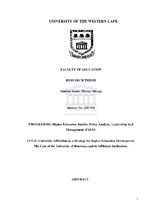University affiliation as a strategy for higher education development: the case of the University of Botswana and its affiliated institutions
Abstract
The study examines the relationship of these institutions with the University of Botswana within the affiliation system. The issues that were investigated were related to the affiliation system in general, and whether it was beneficial to both the University of Botswana and the affiliated institutions. It was found from the study that the relationship is a symbiotic one. Furthermore, the study looked into the articulation of the programmes of the affiliated institutions with those of the University of Botswana. The issue of the level at which diplomates from the Affiliated Institutions join a degree programme at the University of Botswana was also discussed. The current system is that after three years of doing a diploma at an affiliated institution, the diplomate will join a degree programme at the University of Botswana at year two with a diploma that was awarded by the University of Botswana. As a result the diplomate will spend three more years on the degree programme. Moreover, the issue of semesterising the affiliated institutions' programmes, like those of the University of Botswana, was also looked into. Another issue considered was that of monitoring Quality Assurance in the affiliated institutions by the University of Botswana.

